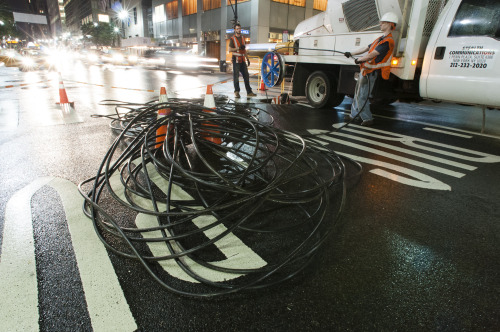
By Yaël Ossowski / March 24, 2015 / Watchdog.org
Much of the debate on the net neutrality regulations — now a reality — hinged on the FCC’s role in enforcing the rules. But after all the
lobbying, all the pressure, and all the attention, is there a chance for
abuse?
For many activists who care about this issue, the final release of
the new rules classifying Internet Service Providers as Title II public
utilities is far from the end in the battle for net neutrality.
Proponents and detractors alike are still mounting their campaigns.
Last week, Marco Rubio published a lengthy op-ed decrying the efforts of the FCC to regulate key parts of the Internet infrastructure.
“The answer to correcting injustice in an economy is to increase
consumer power, not government power,” he wrote in Politico magazine.
For his part, Richard Stallman, founder of the Free Software
Foundation and the brain behind the GNU project, an alternative platform
which gave rise to Linux, was disappointed at what was presented by the
FCC.
“It falls short of true network neutrality in that it fails to tell
the ISPs that they can’t examine the data to check for unauthorized
copying,” said Stallman during a conference at MIT
over the weekend. “It fails to tell the ISPs that they can’t punish
their customers based on what their customers are transmitting.”
Many net neutrality proponents are releasing statements to apply
pressure on the Federal Communications Commission, hoping they’ll turn
up the heat on ISPs as soon as possible and enforce the prohibitions on
throttling and blocking of content deemed lawful.
One of these groups, Free Press, which was instrumental in pushing net neutrality, along with a host of other organizations funded by the Ford Foundation, immediately called on Congress to get in line and accept the ruling, accusing many members of indulging in “conspiracies about the FCC rules.”
Even if groups like Free Press have chided and floated similar theories about FCC chairman Tom Wheeler, a former cable industry lobbyist, due to his connections to Verizon and Time Warner Cable, who actively campaigned against the regulations.
“The restoration of the rule of law is far preferable to the absence
of any legal duty to serve without undue discrimination,” said Tim Kerr,
Free Press’ senior director of strategy.
But considering pro-net neutrality groups, including the Electronic Frontier Foundation and Free Press, have blasted
the FCC for having close ties to the big corporate interests many of
them deplore in this battle, such as Verizon and Time Warner Cable, what
does that mean for how these rules will be enforced?
“Regulatory capture is always going be a concern in the public policy arena, including at the FCC,” Karr told Watchdog.org.
“Reclassifying broadband access providers as common carriers restores
their legal obligation to serve in a just, reasonable and
non-discriminatory manner. And it also means that we have restored the
people’s due process rights, at the FCC and in the courts.”
Therefore, as long as the rules are in place and issues can be adjudicated, says Karr, all is well.
But if rudimentary Internet issues, which used to take place between
private companies, are suddenly thrust into America’s judicial system,
in line with the FCC’s regulations regarding network management, it
shows a heavier hand for government than first anticipated.
As CNBC’s Jake Novak observed:
“Simply put, the net neutrality battle comes down to a question of who
do you trust?” Is it private businesses or the government? Which will do
a better job in watching over the infrastructure of the Internet?
Depending upon how that question is answered, it’s most likely how people feel about these new regulations.
Leave a Reply
You must be logged in to post a comment.